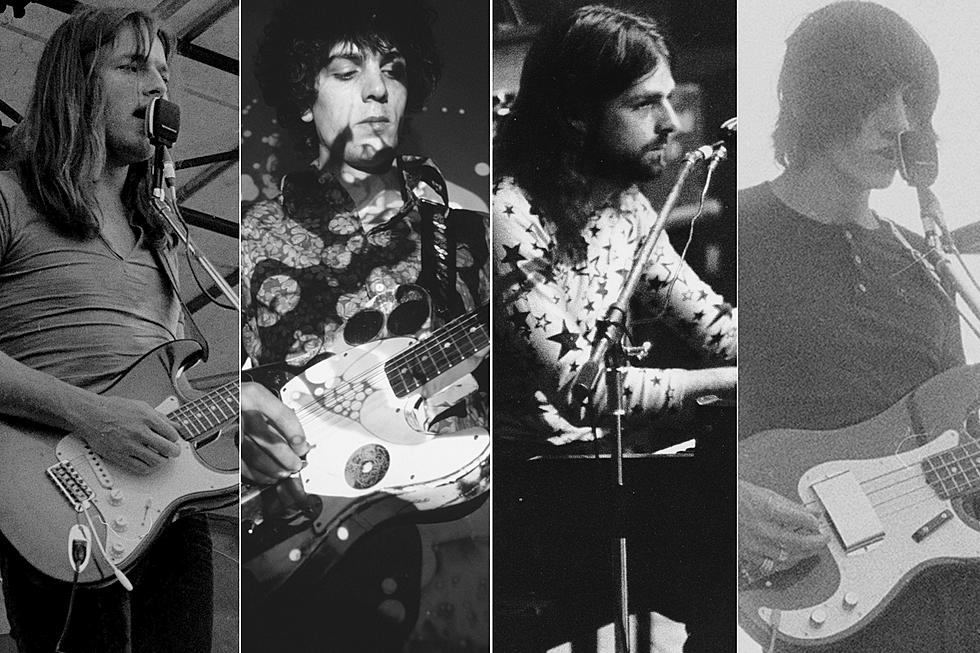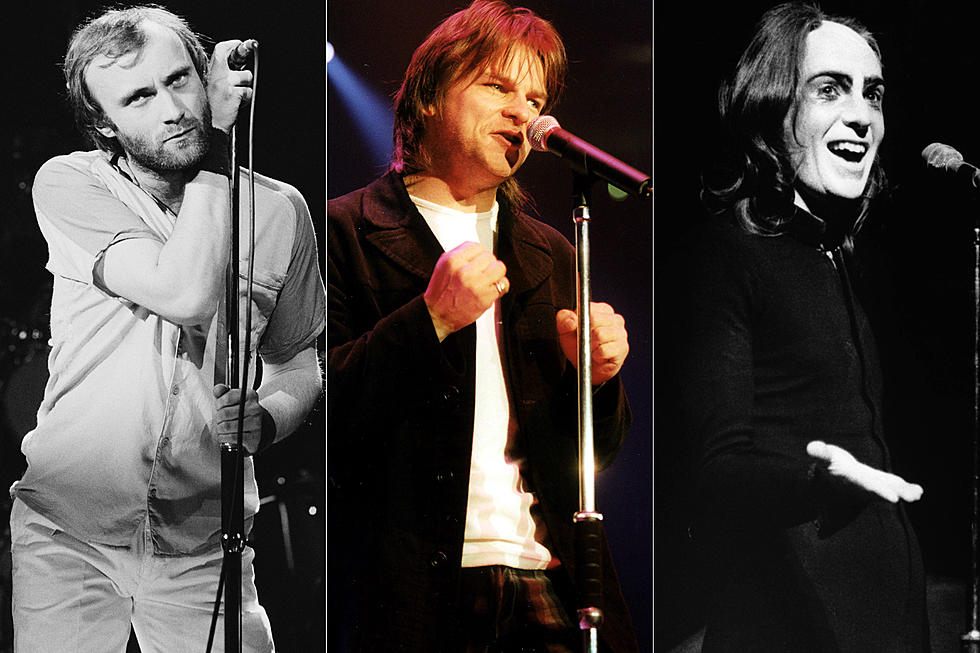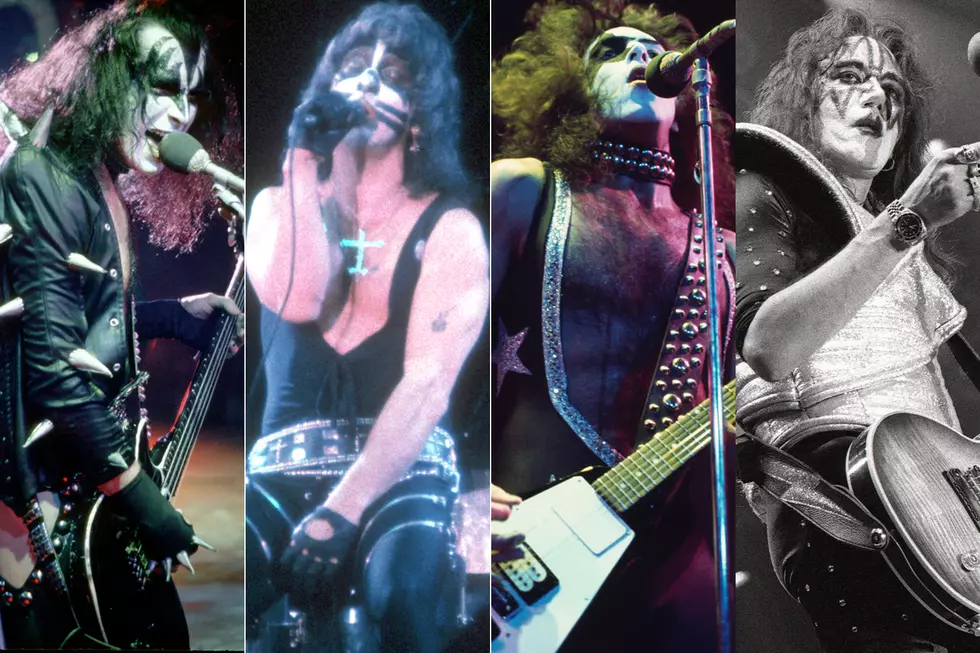
Who Sang the Most Pink Floyd Songs? Lead Vocal Totals
There's never been a "leader" of Pink Floyd. As one of rock's most popular (and challenging) artists, the band has gone through many changes, all while consistently being innovative and ambitious. The power dynamics have never really been equal, but each member has helped to create the group's unmistakable sound.
Thanks to guitarist Syd Barrett, Pink Floyd, originally an R&B group, were quickly launched into the front lines of Britain's psychedelic underground with the release of their debut album, The Piper at the Gates of Dawn. Less than a year later, increased LSD use and mental illness halted Barrett's prolific song output, and the band members (now including replacement guitarist David Gilmour) were torn between continuing his legacy and exploring new sounds for the remainder of the decade.
After several successful experimental albums, the band fully embraced progressive rock under the leadership of bassist Roger Waters. The Waters-era was undoubtedly their most lucrative: The Dark Side of the Moon, Wish You Were Here and The Wall are among the top-selling and critically acclaimed albums of all time. Tensions in the band began to increase as Waters asserted more creative control for his increasingly personal concept albums.
Founding member and keyboardist Richard Wright was eventually fired by Waters, who quit the band after recording his 1983 anti-war statement The Final Cut. Now a duo, Gilmour and drummer Nick Mason continued to record and release Pink Floyd albums into the '90s, when Wright rejoined. Their final album, The Endless River, was released in 2014, six years after Wright's death.
Everybody got a chance to sing lead vocal on at least one of the band's songs, even during the Barrett-dominated '60s and the Waters-led '70s. Some of their best-known songs (like "Have a Cigar") actually use outside singers. The full lead-vocal breakdown is shown below.
Syd Barrett - 9: "Astronomy Domine" (with Wright), "Lucifer Sam," "Matilda Mother" (with Wright), “Flaming,” “Pow R. Toc H.” (with Waters and Wright), “The Gnome,” “Chapter 24,” “The Scarecrow” and “Bike”
Richard Wright – 3: “Astronomy Domine" (with Barrett), "Matilda Mother" (with Barrett) and “Pow R. Toc H.” (with Barrett and Waters)
Roger Waters - 2: “Pow R. Toc H.” (with Barrett and Wright) and “Take Up Thy Stethoscope and Walk”
Pink Floyd's psychedelic masterpiece was largely Barrett's creation. By mid-1967, he had already authored two Top 20 U.K. singles ("Arnold Layne" and "See Emily Play") and 10 of the album's 11 songs. Future band commander Rogers Waters makes his debut with the lone "Take Up Thy Stethoscope and Walk," while Mason and Wright's contributions are limited to the two group-authored instrumental pieces, "Interstellar Overdrive" and "Pow R. Toc H." (though Wright does share lead vocals with Barrett on two songs). "Pow R. Toc H." features wordless vocals and howls by Barrett and Waters, and remained in the band's set list until 1970. The group's manager, Peter Jenner, recites the names of the planets through a megaphone on the spacey opening track, "Astronomy Domine." By the end of the year, drug use and mental illness had taken its toll, and the resulting deficit of new songs made finding a replacement necessary. Friend of the band David Gilmour was hired in early 1968 to cover for Barrett, but he eventually found himself as the band's main lead singer.
A Saucerful of Secrets (1968)
Richard Wright – 3: “Let There Be More Light,” (with Waters and Gilmour), “Remember a Day,” and “See-Saw”
David Gilmour – 2: “Let There Be More Light,” (with Waters and Wright) and “Corporal Clegg” (with Wright and Mason)
Roger Waters - 2: “Let There Be More Light,” (with Gilmour and Wright) and “Set the Controls for the Heart of the Sun”
Syd Barrett - 1: "Jugband Blues”
Nick Mason – 1: “Corporal Clegg” (with Gilmour and Wright)
With label pressure and Barrett's deteriorating mental health, the rest of Pink Floyd found themselves increasingly responsible for writing their own songs. For their second album, every member gets a lead vocal, though Wright and Waters handled most of the songwriting. Waters, who contributed only one track to Piper, wrote the majority of the songs, but gave many of the vocal duties to Gilmour, who had not yet written a song for the band. Wright makes his songwriting debut on this album, with the tracks “Remember a Day” (a leftover from the Piper sessions) and “See-Saw"; Mason makes one of his few vocal contributions to Waters' first anti-war song “Corporal Clegg.” The album's dark closing track, “Jugband Blues,” is Barrett's final song with the band (although his bandmates would later play with him on his two solo albums in 1970). He was ousted from the group two months before the album's release.
David Gilmour – 6: “Cirrus Minor,” “The Nile Song,” “Crying Song,” “Green Is the Colour,” “Cymbaline” and “Ibiza Bar”
Pink Floyd's popularity in England's underground music scene had already secured them three soundtracks by 1969: San Francisco, Tonite Let's All Make Love in London and The Committee. While none of these had an official soundtrack release until much later, the band decided to issue another soundtrack as its first album of 1969. The album was recorded in less than a month and was written almost exclusively by Waters. Unlike on the albums that followed, Waters gave vocal duties to Gilmour, who sings every track on the record. His first song written for the band, “A Spanish Piece,” is a short pseudo-flamenco piece of incidental music with some vaguely Spanish mutterings. More contains some of the band's heaviest material, but many of the songs are experimental pieces used to accompany the psychedelic imagery in the film.
Ummagumma (1969)
Roger Waters - 1: “Granchester Meadows”
David Gilmour – 1: “The Narrow Way”
Pink Floyd's first double album contained half-live, half-studio cuts. The studio side features some of the group's most experimental work. Unusually, each band member contributed a song (though only Gilmour's "The Narrow Way" and Waters' "Granchester Meadows" have lyrics). Waters' other composition, "Several Species of Small Furry Animals Gathered Together in a Cave and Grooving with a Pict," features some bizarre vocal effects that recall "Pow R. Toc H." from their first album. The live half of the album includes no new songs.
Zabriskie Point (1970)
David Gilmour – 2: “Country Song” and “Crumbling Land” (with Wright)
Richard Wright – 1: “Crumbling Land” (with Gilmour)
Unlike More, the original Zabriskie Point soundtrack included songs by other artists. Pink Floyd get the majority of tracks, but one (“Country Song”) was left off at director Michelangelo Antonioni's request. The cut was later appended to the album's track listing on the 1997 reissue.
Atom Heart Mother (1970)
David Gilmour – 1: “Fat Old Sun”
Roger Waters - 1: “If”
Richard Wright – 1: “Summer '68”
Similar to the studio side of their previous album, Ummagumma, each band member (except for Mason) submitted a song for Atom Heart Mother. The lengthy extended pieces that bookend the album are both full-group compositions. The title track was composed with Ron Geesin and employed the Jon Alldis choir for the vocal sections. Geesin worked with Waters on Music From the Body, on which his bandmates contribute backing to the song "Give Birth to a Smile." Atom Heart Mother's closing track, "Alan's Psychedelic Breakfast," features some incidental vocals by the band's roadie, Alan Styles, who was recorded while making breakfast as the band jams for 13 minutes.
Relics (1971)
Roger Waters – 1: “Biding My Time”
By 1971, Pink Floyd had toured the world and scored several hit albums and singles. Because their early singles were now hard to come by, a compilation of some of these rarities was put out for the new fans. Of the album's 11 songs, only one was previously unreleased: "Biding My Time," a Waters composition that was often incorporated into the band's live set around 1969 for an extended piece called "The Man and the Journey."
Meddle (1971)
David Gilmour – 4: “A Pillow of Winds,” “Fearless,” “Seamus” and “Echoes” (with Wright)
Nick Mason – 1: “One of These Days”
Roger Waters - 1: “San Tropez”
Richard Wright – 1: “Echoes” (with Gilmour)
Meddle is one of Pink Floyd's most sonically diverse albums. It also is one of their best. Unlike most of their albums, much of the music was composed collaboratively; Waters' jazzy “San Tropez” is the only solo effort. Two of the album's most enduring songs, the prog opus “Echoes” and the ominous opener “One of These Days,” were collaborations among all of the band members. “One of These Days,” while mostly instrumental, features one of Mason's most famous and disturbing vocal performances, albeit a spoken rather than sung one. The album's penultimate track is a novelty blues ditty featuring barking by Steve Marriott's dog Seamus.
Obscured by Clouds (1972)
David Gilmour – 4: “Burning Bridges” (with Wright), “The Gold It's in the ... ,” “Wot's, Uh the Deal?” and “Childhood's End”
Richard Wright – 2: “Burning Bridges” (with Gilmour) and “Stay”
Roger Waters - 1: “Free Four”
More director Barbet Schroeder once again approached Pink Floyd to provide music for his new film, La Vallée. This time, Pink Floyd released the album under a different title, leading to assumptions that it was a new studio album. Many of the songs are more straightforward than most Pink Floyd songs, though the closing track, "Absolutely Curtains," contains a sample of the Mapuga tribe that plays a role in the movie.
The Dark Side of the Moon (1973)
David Gilmour – 4: “Breathe,” “Time” (with Wright), “Money” and “Us and Them”
Roger Waters - 2: “Brain Damage” and “Eclipse”
Richard Wright – 1: “Time” (with Gilmour)
The iconic Dark Side of the Moon more or less was the beginning of the band's Roger Waters era. The bassist wrote or co-wrote seven of the album's 10 tracks, but vocals were still mostly being handled by Gilmour at this point; Waters sings only the two closing tracks solo. The album also includes several notable vocal performances by outside artists, most famously Clare Torry on “The Great Gig in the Sky” (all post-2005 reissues of the album actually co-credit her as songwriter along with Wright). Interspersed throughout the album are spoken-word samples of the band's friends and contemporaries responding to questions written on note cards. These voices are most noticeable in “On the Run” and “Brain Damage.”
Wish You Were Here (1975)
David Gilmour – 2: “Welcome to the Machine” and “Wish You Were Here”
Roger Waters - 2: “Shine On You Crazy Diamond (Parts I–V)" and “Shine On You Crazy Diamond (Parts VI–IX)"
Roy Harper – 1: “Have a Cigar”
After the monumental success of The Dark Side of the Moon, Pink Floyd wrote a concept album about the music industry. The album also contains many references to founding member Syd Barrett (who coincidentally visited his former bandmates in the studio after several years of no contact). Like Dark Side, Wish You Were Here was a hit. The band again employed guest singers for a few songs: British folk songwriter Roy Harper (the subject of a Led Zeppelin III song) takes over lead vocals on “Have a Cigar," and Ike and Tina Turner collaborator Venetta Fields sings on “Shine On You Crazy Diamond.”
Animals (1977)
Roger Waters - 5: “Pigs on the Wing (Part 1),” “Dogs” (with Gilmour), “Pigs (Three Different Ones),” “Sheep” and “Pigs on the Wing (Part 2)
David Gilmour – 1: “Dogs” (with Waters)
Pink Floyd's winning streak continued with another Waters-penned concept album. Like Wish You Were Here, the album is bookended by a song that serves to unify the album, though this time the tracks are angry and political. Waters' personal and political beliefs would culminate on their next album, The Wall, but here he begins to implement his vision without much input from his bandmates; Gilmour sings only one song (which he co-wrote), "Dogs." Wright, whose role in the band had significantly diminished since the early years, quit the band during the recording, though he would temporarily come back for their next album.
The Wall (1979)
Roger Waters - 23: “In the Flesh?,” “The Thin Ice” (with Gilmour), "Another Brick in the Wall, Part 1,” “The Happiest Days of Our Lives,” “Another Brick in the Wall, Part 2” (with Gilmour), “Mother” (with Gilmour), “Empty Spaces,” One of My Turns,” “Don't Leave Me Now,” “Another Brick in the Wall, Part 3,” “Goodbye Cruel Wrold,” “Hey You” (with Gilmour), “Is There Anybody Out There?” (with Gilmour), “Nobody Home,” “Vera,” “Bring the Boys Back Home,” “Comfortably Numb” (with Gilmour), “In the Flesh,” “Run Like Hell” (with Gilmour), “Waiting for the Worms” (with Gilmour), “Stop,” “The Trial” and “Outside the Wall”
David Gilmour – 11: “The Thin Ice” (with Waters), “Another Brick in the Wall, Part 2” (with Waters), “Mother” (with Waters), “Goodbye Blue Sky,” “Young Lust,” “Hey You” (with Waters), “Is There Anybody Out There?” (with Waters), “Comfortably Numb” (with Waters), “The Show Must Go On,” “Run Like Hell” (with Waters) and “Waiting for the Worms” (with Waters)
Waters continued to assert his dominance over his bandmates during the sessions for his most complex work yet. Waters' sprawling double-album concept record contained some of the band's most ambitious and theatrical songs. Three years after its release in 1979, the album was adapted into a movie, and the band's brief tour of Europe and North America in support of the LP featured complex visual effects. The album was a critical and commercial success too, topping the U.S. chart for 15 weeks. But relations among band members wasn't so great. Gilmour and Wright were recording solo albums at the same time, while Waters left little room for his bandmates on his album. Tensions culminated when Waters fired Wright. Of the album's 26 songs, Waters sings 23; Gilmour sings only three by himself.
The Final Cut (1983)
Roger Waters - 12: "The Post War Dream," “Your Possible Pasts," "One of the Few," "The Hero's Return," "The Gunner's Dream," "Paranoid Eyes," "Get Your Filthy Hands Off My Desert," "The Fletcher Memorial Home," "Southampton Dock," "The Final Cut," "Not Now John" (with Gilmour) and "Two Suns in the Sunset"
David Gilmour – 1: "Not Now John" (with Waters)
Waters made his mark with his last Pink Floyd album. For the first time, he sang and authored every song (except for "Not Now John," on which Gilmour shares lead vocals). Waters even passed by Hipgnosis, a regular collaborator, for the cover art. Like The Wall, The Final Cut is a personal statement based on Waters' life and political beliefs. Specifically, the album deals with the then-current Falklands War and the death of Waters' father on the battlefield in World War II. Tensions were high during the recording sessions; Mason and Gilmour contributed little to the album. This is the only Pink Floyd LP without Wright.
A Momentary Lapse of Reason (1987)
David Gilmour – 9: "Signs of Life" (with Mason), "Learning to Fly," "The Dogs of War," "One Slip," "On the Turning Away," "Yet Another Movie," "A New Machine (Part 1)," "A New Machine (Part 2)" and "Sorrow"
Nick Mason – 1: "Signs of Life" (with Gilmour)
After writing the majority of Pink Floyd material for much of the past decade, Roger Waters left the band in 1985. Wright, who was fired by Waters in 1979, returned for this album, but for legal reasons is not credited as a member. Gilmour stepped up as chief songwriter and sings on all of the album's non-instrumental tracks. Mason recites a poem on the opening track, marking his final vocal performance with the band.
The Division Bell (1994)
David Gilmour – 9: "What Do You Want From Me," "Poles Apart," "A Great Day for Freedom," "Wearing the Inside Out" (with Wright), "Take It Back," "Coming Back to Life," "Keep Talking," "Lost for Words" and "High Hopes"
Richard Wright – 1: "Wearing the Inside Out" (with Gilmour)
Like A Momentary Lapse of Reason, The Division Bell was released without any participation from Waters. Wright, who joined Gilmour and Mason for what turned out to be their last-recorded album, was back in the band and received his first writing credit since 1975. That song, “Wearing the Inside Out,” also features his only vocal on the album, a co-lead with Gilmour. The album was certified triple platinum, and the successful world tour in support of it resulted in a No. 1 live album, Pulse. A leftover hour-long ambient piece from the sessions called “The Big Spliff” would eventually make its way onto the band's last album, The Endless River, 20 years later.
The Endless River (2014)
David Gilmour – 1: “Louder Than Words”
The band's final LP is partially composed of leftover pieces from their previous album, The Division Bell. Again, Waters did not participate in the album's creation (though he did briefly reunite with his bandmates onstage a few times in the '00s). Wright, who died in 2008, is credited as composer on many of the album's tracks. Most of the album is filled with ambient sounds. Only one track features vocals: “Louder Than Words.” The opening track contains some spoken words, and “Talkin' Hawkin'” contains samples of physicist Stephen Hawking. Gilmour and Mason have both said that The Endless River will be the last Pink Floyd album.
The Early Years (2016)
Syd Barrett - 4: "Arnold Layne,” “Candy and a Currant Bun,” “See Emily Play” and “Apples and Oranges”
David Gilmour – 3: “Julia Dream,” “Point Me at the Sky” (with Waters) and “Embryo”
Richard Wright – 2: “Paintbox” and “It Would Be So Nice”
Roger Waters - 1: “Point Me at the Sky” (with Gilmour)
Pink Floyd cleaned out their vault with a massive 33-disc compilation box set in 2106. While casual fans may not find much they know here, collectors and Barrett devotees rejoiced at the abundance of early singles (which are documented above) and previously unreleased recordings. Among them are the band's first six recordings from 1965, a scrapped single and live recordings from the group's first seven years. The first disc includes both sides of their three non-album singles from 1967; the second disc collects the rest. Some songs on the other discs found their way on albums, though only a handful of these tracks - like “Embryo,” first included on a label compilation - contain vocals.
Non-Album Song: "When the Tigers Broke Free" (1982)
Roger Waters – 1: “When the Tigers Broke Free”
Pink Floyd hadn't released an exclusive song as a single since 1968's “Point Me at the Sky”/“Careful With That Axe, Eugene.” “When the Tigers Broke Free,” released in conjunction with the film Pink Floyd The Wall, featured The Wall track “Bring the Boys Back Home” as its B-side. “When the Tigers Broke Free” was originally written for The Wall, but Waters' bandmates dismissed it as "too personal."
Pink Floyd Albums Ranked
More From US 103.1 FM










